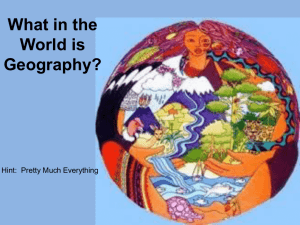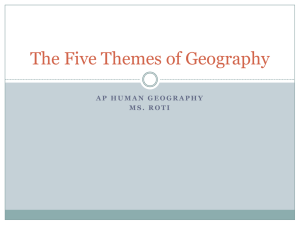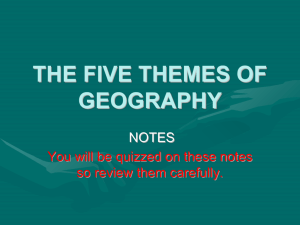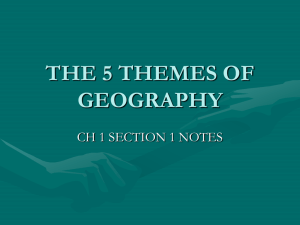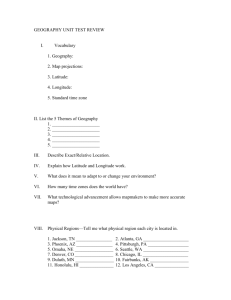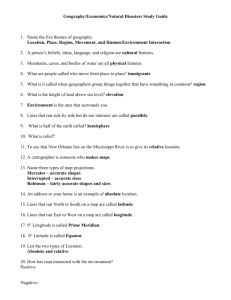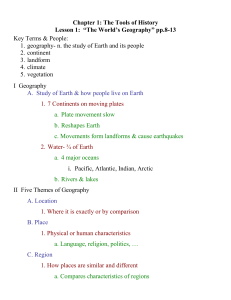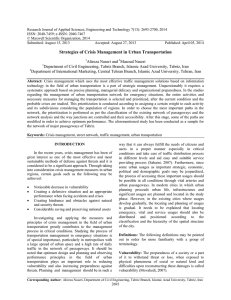U.S. and Global Regents Prep
advertisement
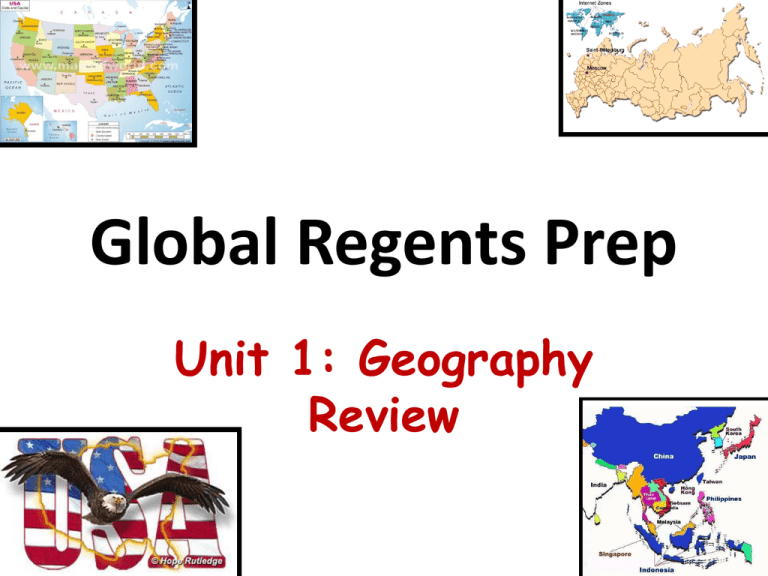
Global Regents Prep Unit 1: Geography Review Concept 1: Geograpy & Its Relation to History Before We Begin . . . • SWBAT/Aim: Illustrate what is geography and how can knowing geographic features of the world help you on the Regents exam? • Do Now: First: Copy the Aim, Date, Homework below. Then: Answer the following question in two to three sentences: “If the Transportation Department of New York City were to remove all of the street signs in NYC, please explain how would you find your way home? • Homework: – Begin working on Geography and World Religion/Philosophy Review Packets – Obtain and Organize your binder • The Five Themes of Geography are: (1) Location (2) Place (3) Region (4) Movement (5) Human-Environment Interaction • Location: Where is it? • There are two types of locations: – – • • Absolute: A location can be absolute (specific) as in coordinates of a map using longitude and latitude Relative: A location can be relative - examples: next door, nearby, a short drive, down the road a ways. Or, it can be in the same general location as another location - example: next to the post office. Place : A place is an area that is defined by everything in it. All places have features that give them personality and distinguish them from other places. If you refer to your school as a place, then that place would include walls, windows, gym, cafeteria, classrooms, people, clothing, books, maps, mops, brooms, hallways, mice (if you have them) and everything else in the school, including the languages spoken. • Region: A region is an area that is defined by certain similar characteristics. Those unifying or similar characteristics can be physical, natural, human, or cultural. • Movement : Movement refers to the way people, products, information and ideas move from one place to another. This can be local such as how did you get to school today, or it can be global such as how did humans get to North America? • Human-Environment Interaction : Human-environment interaction looks at the relationships between people and their environment; how people adapt to the environment and how they change it. Geographic Landforms • Geographic landforms are placed into two categories: • (1) Elevation (Mountains, Plateaus, Plains, River Valleys) • (2) Sides which border water (Land Mass (Continent or countries that are connected, Peninsulas (3 sides) , Islands (4 sides) Bodies of Water Lake Oceans & Seas • A body of water is any significant accumulation of water, usually covering the Earth or another planet. The term body of water most often refers to large accumulations of water, such as oceans, seas, and lakes, but it may also include smaller pools of water such as ponds, puddles or wetlands. Passageways • Humans throughout history have used waterways to transport goods, armies, and themselves. Oftentimes they have had to travel on waterways between large bodies that were either made by nature or when necessity called for it created their own passageways. The three passageways are straits, channels and canals. Types of Maps • To show geography of the planet cartographers use three types of maps: • (1) Political Maps • (2) Physical Maps • (3) Climate Maps Finding Locations: Longitude and Latitude • Latitude (shown as a horizontal line) is the angular distance, in degrees, minutes, and seconds of a point north or south of the Equator. Lines of latitude are often referred to as parallels. Longitude (shown as a vertical line) is the angular distance, in degrees, minutes, and seconds, of a point east or west of the Prime (Greenwich) Meridian. Lines of longitude are often referred to as meridians. Workgroup Activity • Now label all 50 states with their proper capitals • After completing the U.S. political map, label the “World Continents” map, place all capitals and countries on your Political Map of Europe. • Time permitting . . . Continue working on Geography Review packet #1 using your notes, binder, and textbook.
